For multi-instrumentalist and A-list side musician Dean Fertita, a sophomore solo release has been a long time coming. The anticipated Tropical Gothclub, released in late 2022, is his first record since his 2009 debut, Hello=Fire. Fertita can’t help but nod to the lapse of time between then and now. “The song ‘Double Blind,’ I wrote that for my daughter before her first birthday,” he says about the album’s dreamy, Flaming Lips-like second single. “She just turned 11, and that’s the oldest song of the bunch.”
In that interim, the guitarist has had a lot to keep him busy. Since the mid ’00s, he’s been a part of a number of ongoing projects: He plays guitar and keys in Queens of the Stone Age, has been a touring member of the Raconteurs—whose lineup includes Fertita’s high school friend, multi-instrumentalist Brendan Benson—and formed the Dead Weather with the Kills’ vocalist Alison Mosshart and Jack White. Between touring, writing, and recording with these groups, Fertita also manages to squeeze in session work with artists such as Karen O and Iggy Pop.
Where There is Water
The trippy Tropical Gothclub was recorded during Fertita’s pandemic-era touring downtime and is made up of songs he’d been collecting for over a decade.
That sheer volume of work is a full-time creative effort. It’s a constant cycle, and for Fertita, the genesis of “what’s next” usually emerges just as another undertaking is winding down. But then came March 2020, and—like everyone else—he found himself in a pandemic break with time to focus on his solo projects again.
“In early 2020, we just finished the Raconteurs run,” Fertita says. “I didn’t know what was going on for the next few months for work, but I knew that in the not-so-distant future, we were planning on getting back together for Queens [of the Stone Age]. Alison Mosshart and I were talking about how we were both home for a while. We both had a few songs, and we started sending demos back and forth to each other. That got the wheels turning for me. A month later, we were locked down. But I was already in this mode of working through songs and arrangements and things that might work if we did a Dead Weather record.”
“The entire record was making sense of 10 years of fragmented ideas.”
“We were operating under the illusion [that the lockdown wouldn’t last very long],” Fertita laughs. “We decided to go through our ideas so we could be sharp and ready to go. I just kept recording my ideas. There was nothing else going on. I also had so many fragments of songs that had been laying around for years. In my mind, I was putting them in these different aisles: ‘This one would go good in Queens, and this one would work over here.…’ I just kept working, and at the end of that process I had a record’s worth of material and nowhere that it was immediately going to go. Jack encouraged me just to release it as it is, even though that was not even something I was considering at the time.”
Intentional or not, that collection of bits and bobs became Tropical Gothclub. In a sense, it sounds like what you’d expect from an artist immersed in the Third Man and Queens of the Stone Age universes—a heaping mass of abrasive, pedal-generated fuzz tones—except that Fertita, with his decades of experience, pushes that to another level entirely. Barnburners like “No Wonder,” with its intricate harmonized leads, and the call-and-response-heavy “Death Rattle” ooze enough of a guitar-orchestra vibe that they could almost be outtakes from Physical Graffiti. Others, like “Needles,” “Wheels Within Wheels,” and “Uniform Looks,” combine strong hooks, propulsive energy, and a seemingly endless variety of tones. The album also features more trippy moments—tempered with the occasional acoustic track—on songs like “Where There Is Water” and “Double Blind.”
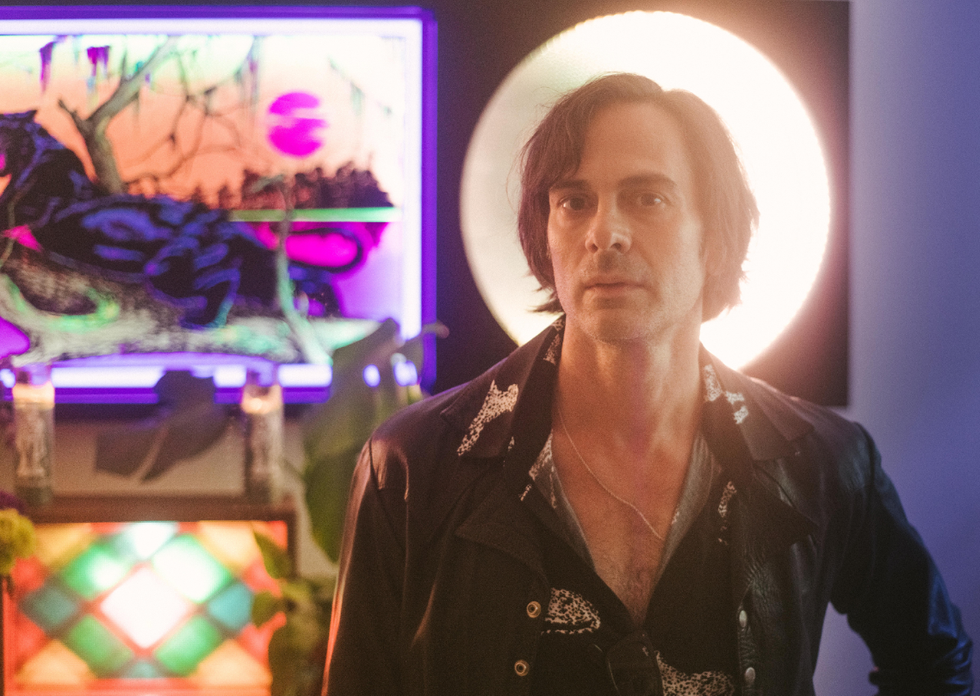
Dean Fertita radiates the hazy surrealism of Tropical Gothclub.
Photo by Angelina Castillo
Fertita recorded much of Tropical Gothclub in a small A-frame house he built in his backyard, reassembling sections taken from lengthier jam sessions and working with snippets collected over the years. “The entire record was making sense of 10 years of fragmented ideas,” he says. “Sometimes, it was a 15-minute jam that I did with a drummer that we would arrange and figure out what it was. Some things I revisited and tightened up because they were recorded on GarageBand and then put into a Logic session.”
At some point in the process, Fertita brought Detroit-area engineer Dave Feeny (The White Stripes, Josh Ritter, Mule) on board to help sort through the clutter. “I’ve known Dave for a very long time,” he says. “I did another record in a similar way with him, which means he totally understands the various degrees of ‘done’ of the things that are sent to him. He just knew what I was going for and we could talk quickly. He was able to move it at a quick enough speed that it would be interesting. I’d get it back in a day and think, ‘I can do this now. I can play bass to this song now that we have a drum arrangement figured out’—or whatever it was.”
“This record—Tropical Gothclub—became a culmination of all my split personalities.”
Fertita is a connoisseur of tones, and he’s sensitive to subtle tweaks and changes. Different instruments, situations, and especially pedals affect his playing and approach. “Pedals always instantly change a frame of reference for me,” he says. “Sometimes you’ll hear a sound, and you’ll write to that sound immediately. I am always looking for character, and maybe even the weird thing that you’re not supposed to use—something that’s just going to be interesting sounding and different from the get-go.”
Working with so many different musicians inspires and triggers different chemical impulses as well. He points out that in QOTSA, “there are these two incredible guitar players,” and adds, “In Dead Weather, Jack predominantly plays drums, but we do play a lot of guitar together as well, and the stuff that he plays on those records is insane.”
Dean Fertita’s Gear
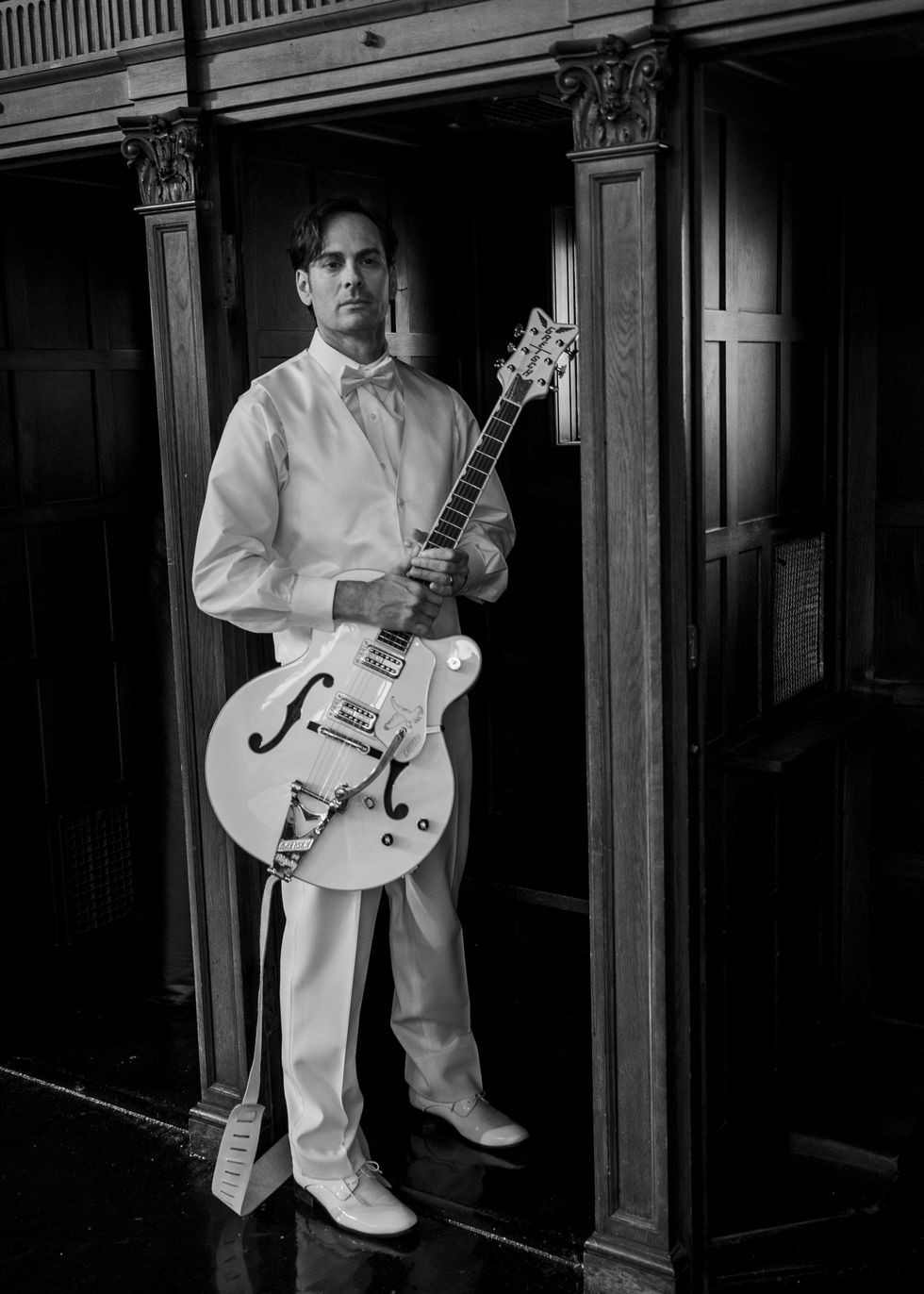
Fertita and his matching Gretsch White Falcon.
Photo by Andreas Neumann
Guitars
- Troy Van Leeuwen Fender Jazzmaster
- Goya Rangemaster
- Echopark Esperanto Z (Custom 9-string)
- Gretsch White Falcon
Amps
- No-name “magnetic” amplifier
- Fender Deluxe Reverb
- Supro Reissue Amp
- Silvertone Amp
Strings & Picks
- Ernie Ball .010s
- Fender Mediums
Pedals
- Binson Echorec 2 T7E
- Death By Audio Deep Animation Envelope Filter
- Death By Audio Supersonic Fuzz Gun
- Dunlop Fuzz Face Distortion
- EarthQuaker Devices Park Fuzz Sound
- Eventide H9 Max Harmonizer
- Fulltone Tube Tape Echo
- Gamechanger Audio Third Man Records Plasma Coil Distortion
- Ibanez AW7 Tone-Lok Autowah
- Mu-Tron Bi-Phase
- MXR Poly Blue Octave Pedal
- Old Blood Noise Reflector Chorus
- Third Man Records Bumble Buzz octave fuzz
- UREI Universal Audio Cooper Time Cube
- Way Huge Atreides Analog Weirding Module
Each band and project that Fertita participates in informs what he’s put into his solo music. “There’s no shortage of insane inspiration to try and fit in and complement what’s going on [in the album] already,” he says. “This record—Tropical Gothclub—became a culmination of all my split personalities. One idea I struggled with after making this record was: Shouldn’t I have made a stronger effort to make it totally different from the other things that I do, to show a completely different side? But there are different sides to my personality that get drawn out more, depending on the project that I am in. You probably can hear examples of how I would play if I were playing with Queens on this album.”
Fertita is not only flexible and productive as a guitarist and songwriter, he’s also a keyboardist, and that multi-instrumentalism helped connect some dots in his professional live.
“In Dead Weather, Jack predominantly plays drums, but we do play a lot of guitar together as well, and the stuff that he plays on those records is insane.”
“In 2005,” he explains, “I was on tour with Brendon Benson, and the first thing we did was an acoustic run in the U.K. As we were rehearsing, we thought it might be more interesting to break it up and have some songs on guitar and others on keys. I started to relearn them at that point.”
He had taken piano lessons as a child but put it aside as a teen. “I was stumbling through it but doing that led to the Raconteurs [Editor’s note: He plays both guitar and keys in that band when they’re on the road]. Our front-of-house engineer for that first tour was this guy Hutch, who had been with Queens since the beginning. He introduced me to the Queens guys, and 14 years later I am still doing that, too.”
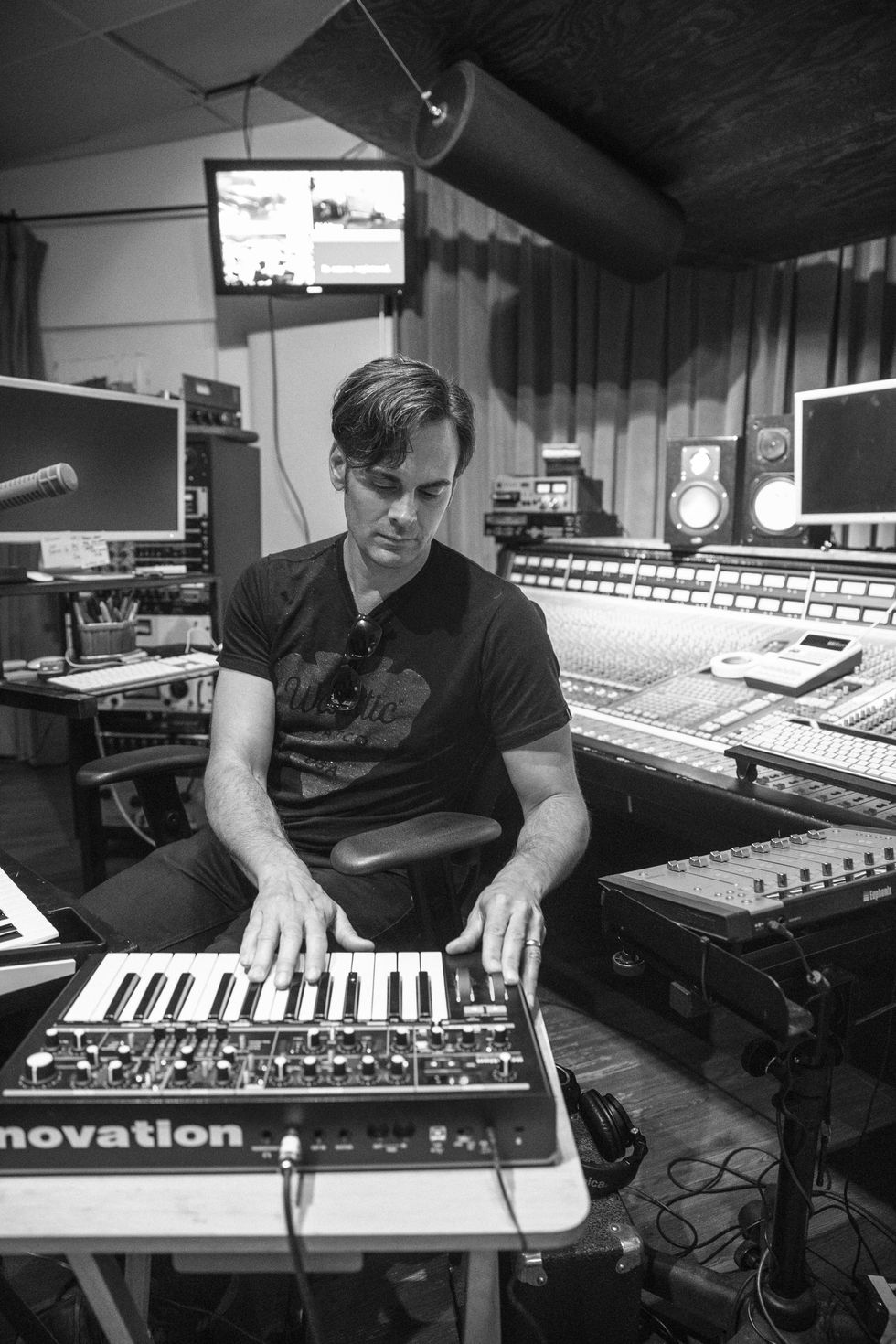
As a multi-instrumentalist, Dean Fertita is an in-demand touring musician. He plays both guitar and keys for the Raconteurs on the road.
Photo by Andreas Neumann
What was it like to suddenly go pro on a less-familiar instrument? Did he get the jitters, or suffer from impostor syndrome? “I could keep up,” he laughs. “I was still holding my breath a little bit, but I felt like I could do what I had to do in that scenario. I wasn’t pushing boundaries. I was playing at the edge of my abilities most days.”
Fertita mostly reserves his limit-pushing for his work as a guitarist and songwriter. And one thing left to do is to play “Double Blind” for his daughter. “I have not played it for her yet,” he says. “I don’t want to embarrass her. She is aware that it exists, and I think she’ll listen to it alone. Maybe she’ll never tell me she’s heard it.”
The Dead Weather "I Feel Love" - Live on The Late Show
Dean Fertita is in his element, delivering blazing riffs on his Gretsch White Falcon with Alison Mosshart and Jack White as the Dead Weather on The Late Show.















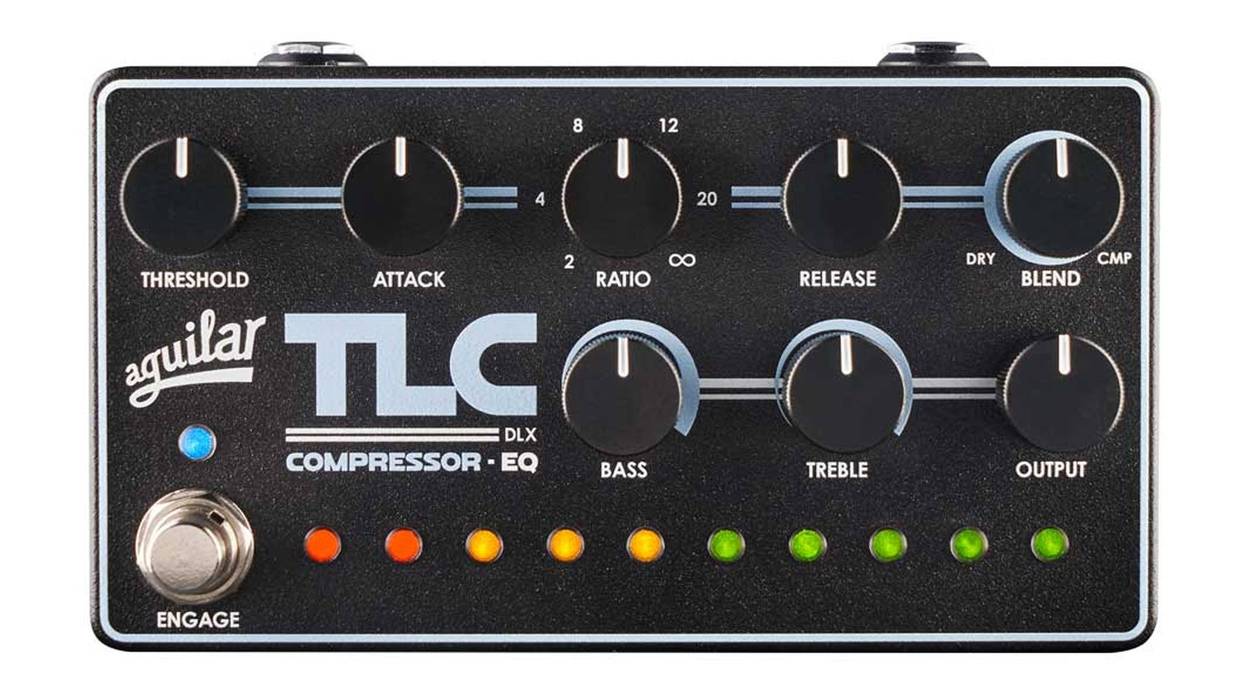
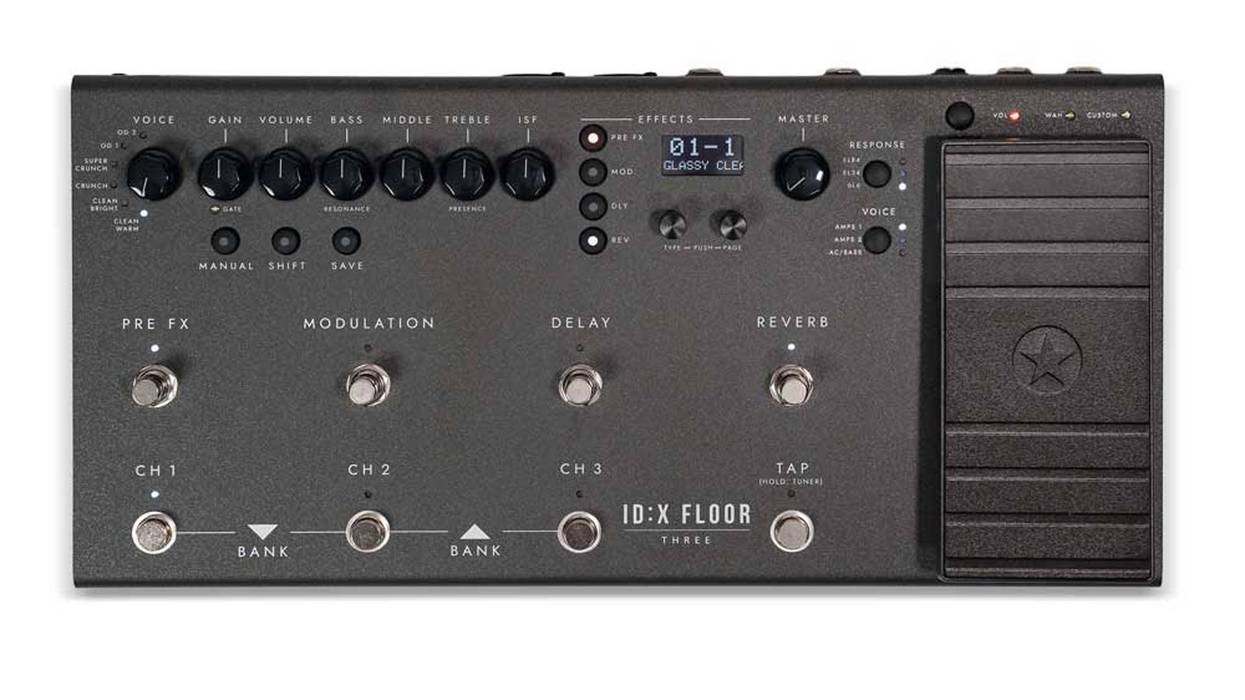



![Rig Rundown: Russian Circles’ Mike Sullivan [2025]](https://www.premierguitar.com/media-library/youtube.jpg?id=62303631&width=1245&height=700&quality=70&coordinates=0%2C0%2C0%2C0)






